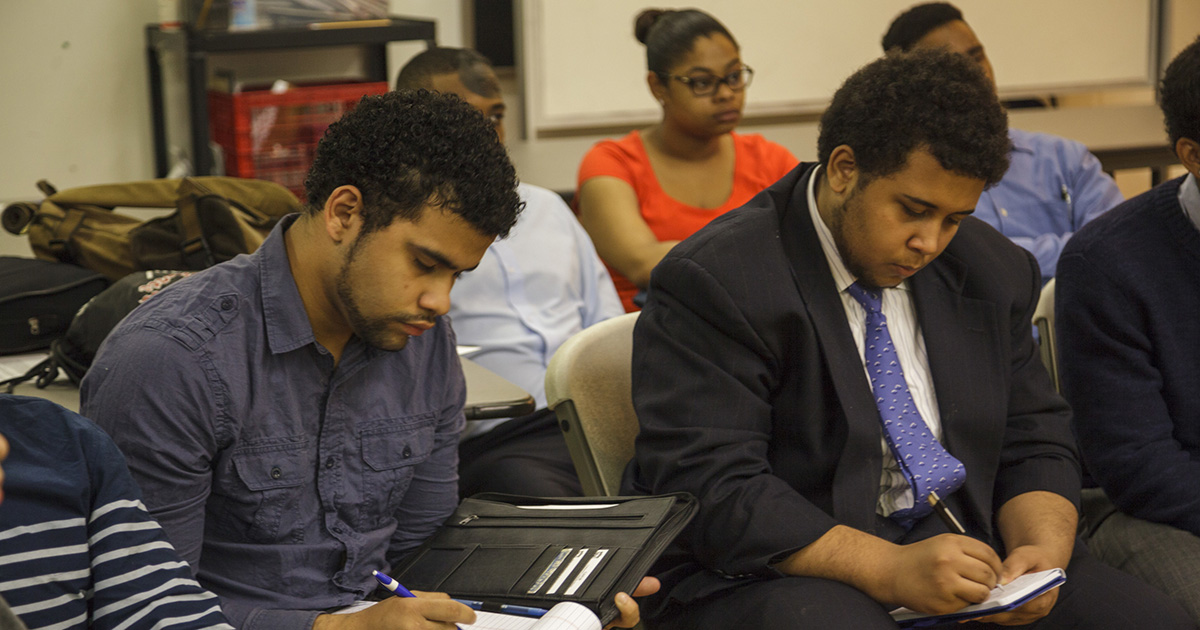Findings from the Project Rise Implementation Evaluation
Project Rise

Overview
In the United States, over six million young people are “disconnected” — neither in school nor working. Over a million of these disconnected young adults are between the ages of 18 and 24 years but lack either a high school diploma or equivalency certificate. These young adults’ limited education and work experience severely reduce their prospects for becoming economically self-sufficient members of society. Neglecting these young people can exact a heavy toll not only on the individuals but also on society as a whole. Based in part on findings from the Center for Economic Opportunity’s (CEO’s) Young Adult Internship Program and Young Adult Literacy Program, Project Rise combines paid internships with high school equivalency education to improve participants’ future education and employment prospects.
As part of a larger Social Innovation Fund (SIF) project, the Mayor’s Fund to Advance New York City and CEO conducted the Project Rise implementation evaluation to assess the feasibility and promise of a yearlong program in which participation in internships is conditional on participation in education activities. The program serves low-income young adults between the ages of 18 and 24 years who lack high school diplomas or equivalency certificate, have been out of school or work for more than six months, and read at the sixth-grade level or higher (with half reading between the sixth- and eighth-grade levels). Participants are required to attend high school equivalency classes in order to remain eligible for part-time paid internships. The Project Rise study tracked the program’s implementation at five sites in three cities (New York City; Newark, NJ; and Kansas City, MO) and examined participants’ program activities and outcomes over 12 months. MDRC released the final project findings in October 2015.
Additional Project Details
Agenda, Scope, and Goals
Project Rise operates in New York City, Newark, NJ, and Kansas City, MO, and enrolls participants in cohorts of 25 to 30 every six months. Upon enrollment, participants are assigned case managers and progress through the following sequence of activities over a 12-month period:
- Pre-internship: Participants engage in group activities, receive soft-skills and job-readiness training, and begin their high school equivalency classes.
- Education: Participants attend appropriate educational activities throughout the 12-month program.
- Internship: After completing a required amount of preliminary educational instruction, participants are placed in paid internships for up to 18 weeks, with internship participation contingent on continued, regular attendance in the education component.
- Post-internship: Case managers work with participants to place them into unsubsidized jobs while participants continue educational activities.
The Project Rise evaluation addressed three main questions:
- Within the overall population of disconnected young adults, what were the characteristics of the participants who entered Project Rise, and what drew them to the program?
- How did the different providers implement the program model, and what adjustments did they make over time?
- What were the duration and intensity of the participants’ engagement in the program, and what outcomes did participants achieve during the 12-month program period
Design, Sites, and Data Sources
The Project Rise implementation study was a descriptive one that considered how sites put their programs in place. The research primarily focused on five cohorts of 25 to 30 participants at each of the five sites. The evaluation explored the local programs’ outreach and recruitment efforts; described participants at study entry; recounted their progress through the program; reviewed their levels of program activity in the education, internship, and case management components; and tracked their educational and employment outcomes.
The major data sources for the research included a baseline survey of participants, program activity data from each site’s management information system, program records on recruitment and screening procedures, observations of program activities, and interviews with participants and program staff members.
Providers of Project Rise included:
- Full Employment Council (Kansas City, MO)
- T.E.E.M. Gateway at Rutgers University (Newark, NJ)
- The Door/FEGS Health & Human Services (New York City)
- Henry Street Settlement (New York City)
- Kingsborough Community College (New York City)






